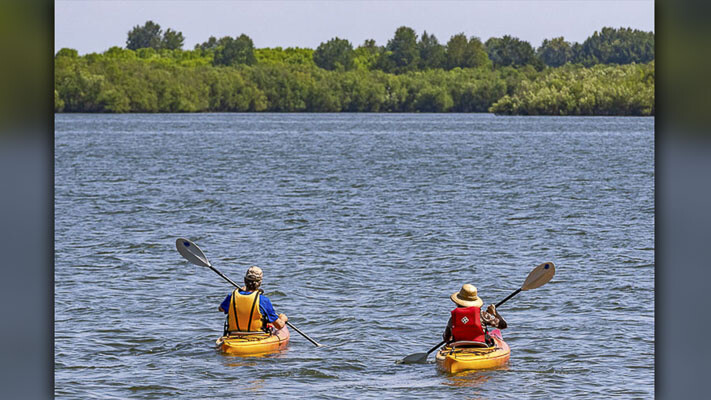
Results from water samples taken from Vancouver Lake on Monday revealed cyanotoxins above the threshold levels recommended by the Washington Department of Health
VANCOUVER – Clark County Public Health has issued a warning advisory at Vancouver Lake due to elevated levels of cyanotoxins from harmful algae. The warning advisory at Lacamas Lake also remains in place.
Public Health has been monitoring harmful algal blooms at Vancouver Lake since early July. Results from water samples taken from Vancouver Lake on Monday revealed cyanotoxins above the threshold levels recommended by the Washington Department of Health. Warning signs are being placed at public access points at the lake.
Public Health issued a warning advisory for Lacamas Lake on July 7. Results from water samples taken from Lacamas Lake on Monday indicated toxin levels remain elevated at the lake.
Cyanotoxins can be harmful to people, especially young children, and deadly for small pets that drink the water. While the warning advisory is in place, health officials recommend:
- No swimming or water skiing.
- No water contact for animals.
- Avoiding areas of scum when using motorized boats, paddle boarding, kayaking or canoeing.
- No drinking lake water.
- Cleaning fish well and discarding organs.
Public Health will continue to monitor Vancouver and Lacamas lakes and, while blooms are present, take weekly water samples to test toxin levels. Signs will be updated as conditions change.
Harmful algal blooms can pose a significant health risk if the cyanobacteria or toxins are ingested, inhaled or contact skin. Inhaled bacteria or toxins could cause wheezing, coughing, chest tightness and shortness of breath. Skin contact could lead to rash, itching, blisters and eye irritation.
If water with cyanotoxins is accidentally swallowed, symptoms could include abdominal pain, diarrhea, vomiting, numbness of the lips, tingling in fingers and toes, and dizziness.
Additional information about harmful algal blooms and current advisories are posted on the Public Health public beach website. To report algal blooms in other bodies of water, visit the Public Health website.
Information provided by Clark Co. WA Communications.
Also read:
- Opinion: OIC tells consumers not to pay for ‘insurance’ you won’t likely benefit from: Does that include WA Cares?Elizabeth New (Hovde) of the Washington Policy Center believes you should consider yourself warned by the Office of the Insurance Commissioner about WA Cares and its maybe-only benefit.
- Opinion: Same road, different speed limit?Target Zero Manager Doug Dahl addresses a question about speed limit signs going into and leaving town.
- Progress being made at GRO Parade of Homes siteThe 2024 GRO Parade of Homes, presented by the Building Industry Association of Clark County, is a little more than a month away, and builders are busy completing the luxury homes before the big event, scheduled for Sept. 6 through 22 in Felida.
- Has trust in the media tanked over coverage of President Biden’s decline?After President Joe Biden’s calamitous debate performance against former President Donald Trump, and days after Biden’s decision Sunday not to seek reelection, there are still many questions about how the news media covered Biden’s mental and physical decline.
- Opinion: Hiding the growing cost of the Interstate Bridge replacementJoe Cortright of the City Observatory addresses the rising cost of the Interstate 5 Bridge replacement project.
- Letter: ‘This election I am NOT voting for Greg Cheney’Clark County resident Wynn Grcich shares her thoughts on Rep. Greg Cheney and the issue of fluoridation in area drinking water.
- Major gas line leak closes major arterial in Clark CountyFirefighters from Clark County Fire District 6 responded Thursday (July 25) afternoon to the scene of a major natural gas leak on NE 99th Street, directly in front of Columbia River High School.











